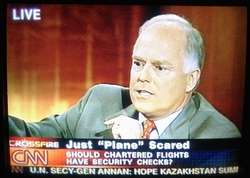Tue, Jun 10, 2003
 NATA President James K. Coyne last week expressed
to Transportation Security Administration (TSA) officials his
strong concerns that the federal government's continuing efforts to
reassure the American public of their security is doing irreparable
harm to the nation's general aviation industry. Coyne's comments to
TSA officials came during a regularly scheduled meeting June 4
involving NATA and other organizations representing different
segments of the general aviation industry.
NATA President James K. Coyne last week expressed
to Transportation Security Administration (TSA) officials his
strong concerns that the federal government's continuing efforts to
reassure the American public of their security is doing irreparable
harm to the nation's general aviation industry. Coyne's comments to
TSA officials came during a regularly scheduled meeting June 4
involving NATA and other organizations representing different
segments of the general aviation industry.
"Time and time again, we see general aviation bearing the brunt
of the federal government's public statements about specific
actions it is taking in the war on terrorism." Coyne said after the
meeting. "It is imperative that policy makers in the administration
understand that they are doing great harm to this industry when
they highlight meaningless restrictions imposed on general aviation
in the name of national security."
 TSA officials in the meeting responded that the
fears expressed by Coyne and others were very real. "You have every
right" to be concerned about the damage the public's perception of
these restrictions is doing to the general aviation industry,
responded one official.
TSA officials in the meeting responded that the
fears expressed by Coyne and others were very real. "You have every
right" to be concerned about the damage the public's perception of
these restrictions is doing to the general aviation industry,
responded one official.
Continuing to publicize either new restrictions on general
aviation or air defense exercises involving single-engine airplanes
- as the Department of Defense did last week - is "leading to
public animosity" toward the industry Coyne said during the
meeting. "There is no need to frighten the American public about
small airplanes," noting that much has been done since September
2001 to improve general aviation security.
 "Public perception is everything," Coyne said
after the meeting. "In the current environment, everything the
federal government does in the security arena is highly publicized.
When the federal government publicizes the things it is doing to
further secure general aviation without publicizing its actions to
secure rental trucks or recreational boats, it leaves the public
thinking that small airplanes are a threat while other activities
are not.
"Public perception is everything," Coyne said
after the meeting. "In the current environment, everything the
federal government does in the security arena is highly publicized.
When the federal government publicizes the things it is doing to
further secure general aviation without publicizing its actions to
secure rental trucks or recreational boats, it leaves the public
thinking that small airplanes are a threat while other activities
are not.
"I think the history of terrorist attacks in the U.S. and abroad
demonstrates that general aviation is not the threat many in the
federal government would have the public believe," Coyne concluded.
"Yet, that's not the message being sent by the government. That
message needs to change."
More News
“This recognition was evident during the TBMOPA Annual Convention, where owners and operators clearly expressed their satisfaction with our focus on customer service, and enc>[...]
Overhead Maneuver A series of predetermined maneuvers prescribed for aircraft (often in formation) for entry into the visual flight rules (VFR) traffic pattern and to proceed to a >[...]
Aero Linx: Glenn H. Curtiss Museum The Glenn H. Curtiss Museum, bearing the name of Hammondsport’s favorite son, is located on State Route 54, one half mile south of the vill>[...]
The Flight Instructor Noticed Some Engine Roughness And Diverted Toward Westwinds Airport On November 2, 2025, about 1630 mountain standard time, an experimental amateur-built Just>[...]
From 2014 (YouTube Edition) -- Disclaimer: No Matter What He Tells You, Tom Is Not A Certified Firefighting Pilot While at EAA AirVenture 2014, ANN News Editor, Tom Patton checked >[...]
 Aero-News: Quote of the Day (11.20.25)
Aero-News: Quote of the Day (11.20.25) ANN's Daily Aero-Term (11.20.25): Overhead Maneuver
ANN's Daily Aero-Term (11.20.25): Overhead Maneuver ANN's Daily Aero-Linx (11.20.25)
ANN's Daily Aero-Linx (11.20.25) NTSB Prelim: Just Highlander
NTSB Prelim: Just Highlander Classic Aero-TV: Just Like The 'Real' Thing Redbird/Disneys Dusty FlightSim
Classic Aero-TV: Just Like The 'Real' Thing Redbird/Disneys Dusty FlightSim





